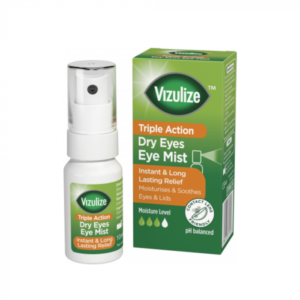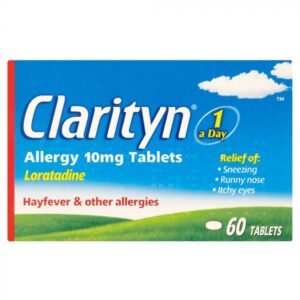Description
This medication works by blocking histamine, the substance in your body that triggers allergic reactions. Piriton comes in various forms, including tablets and syrup. While it’s effective in managing allergies, it can cause drowsiness, so it’s best to avoid driving or operating heavy machinery after taking it.
Ingredients in Piriton Allergy Tablets
Piriton Allergy Tablets contain the following ingredients:
Active Ingredient:
- Chlorphenamine Maleate (4 mg): This is the active ingredient that helps to relieve allergy symptoms.
Inactive Ingredients (Excipients):
- Lactose Monohydrate: A sugar used as a filler or binder in the tablet.
- Maize Starch: Acts as a disintegrant to help the tablet break down in the body.
- Magnesium Stearate: A lubricant that prevents the tablet from sticking to manufacturing equipment.
- Pregelatinised Maize Starch: Helps in the tablet’s formulation and stability.
These ingredients work together to ensure the effectiveness, stability, and manufacturability of the tablet.
Side effects of taking Piriton allergy tablets
Piriton allergy tablets, like many medications, can cause side effects in some people. Here are the most common side effects:
Common Side Effects:
- Drowsiness: This is the most frequently reported side effect. Piriton can make you feel sleepy, so it’s important to avoid driving or operating heavy machinery after taking it.
- Dry Mouth: You may experience a dry mouth while using Piriton.
- Dizziness: Some people may feel lightheaded or dizzy.
- Headache: Piriton can sometimes cause headaches.
- Blurred Vision: This may occur as a result of the medication’s effect on your body.
Less Common Side Effects:
- Nausea or Vomiting: Some users may feel nauseous or actually vomit.
- Constipation: Piriton can slow down bowel movements, leading to constipation.
- Difficulty Concentrating: The drowsiness caused by Piriton might also make it hard to focus or concentrate.
- Dry Eyes or Blurred Vision: Your eyes might feel dry, and your vision might become blurred.
Rare Side Effects:
- Allergic Reactions: In rare cases, some people may have an allergic reaction to Piriton, which can cause symptoms like rash, itching, swelling (especially of the face, tongue, or throat), severe dizziness, or trouble breathing.
If you experience any severe side effects or signs of an allergic reaction, it’s important to seek medical attention immediately. Always consult with a healthcare provider if you have concerns about taking Piriton or if you’re experiencing side effects.
Warnings and precautions of taking Piriton allergy tablets
When taking Piriton Allergy Tablets, it’s important to be aware of the following warnings and precautions:
Warnings:
- Drowsiness: Piriton can cause significant drowsiness. Avoid driving, operating heavy machinery, or engaging in activities that require full alertness until you know how the medication affects you.
- Alcohol: Consuming alcohol while taking Piriton can increase drowsiness and impair your ability to function. It’s best to avoid alcohol during treatment.
- Interactions with Other Medications: Piriton can interact with other medications, particularly those that also cause drowsiness, such as sedatives, sleeping pills, and some antidepressants. Always inform your healthcare provider about any other medications you are taking.
- Medical Conditions: If you have certain medical conditions, such as asthma, glaucoma, enlarged prostate, liver disease, epilepsy, or high blood pressure, you should consult your doctor before taking Piriton, as it may exacerbate these conditions.
Precautions:
- Pregnancy and Breastfeeding: If you are pregnant or breastfeeding, consult your healthcare provider before using Piriton. The medication can pass into breast milk and may affect your baby.
- Age Considerations: Piriton should be used with caution in elderly individuals and children. The elderly are more susceptible to side effects like confusion, dizziness, and drowsiness. Children under the age of 6 should not take Piriton unless directed by a doctor.
- Allergies: Do not take Piriton if you are allergic to chlorphenamine maleate or any other ingredients in the tablet.
- Long-Term Use: Piriton is generally recommended for short-term use. Prolonged use should be done under medical supervision to avoid potential complications or dependency.
General Advice:
- Dosage: Always follow the dosage instructions provided by your healthcare provider or as indicated on the package. Do not exceed the recommended dose.
- Symptoms of Overdose: If you accidentally take too much Piriton, symptoms may include severe drowsiness, agitation, seizures, or difficulty breathing. Seek immediate medical attention if an overdose is suspected.
It’s essential to discuss any concerns or questions with your healthcare provider before taking Piriton to ensure it is safe and appropriate for your specific situation.
How to take Piriton allergy tablets
Taking Piriton Allergy Tablets correctly is important for ensuring their effectiveness and minimising side effects. Here’s how to take them:
Dosage:
- Adults and Children Over 12 Years: Take one tablet (4 mg) every 4 to 6 hours. Do not exceed six tablets (24 mg) in 24 hours.
- Children Aged 6 to 12 Years: Take half a tablet (2 mg) every 4 to 6 hours. Do not exceed three tablets (12 mg) in 24 hours.
- Children Under 6 Years: Piriton tablets are not recommended for children under 6 years of age unless prescribed by a doctor.
Instructions:
- Swallow the Tablet Whole: Take the tablet with a glass of water. You can take it with or without food.
- Follow the Schedule: Space out the doses evenly throughout the day. If you miss a dose, take it as soon as you remember, but skip it if it’s almost time for your next dose. Do not double up doses to make up for a missed one.
- Storage: Keep Piriton tablets in a cool, dry place away from direct sunlight and out of reach of children.
If you have any questions or concerns about how to take Piriton Allergy Tablets, it’s best to consult your GP for personalised advice.







Reviews
There are no reviews yet.